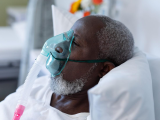Women and adults with preexisting conditions such as cardiovascular disease are less likely to recover from COVID-19 within 3 months, while vaccination and Omicron-variant infection were linked to a quicker recovery, reveals a study posted yesterday in JAMA Network Open. It also showed that more than one in five adults had protracted recoveries.
From April 2020 to February 2023, Columbia University researchers tracked 4,708 first-time COVID-19 patients participating in 1 of 14 ongoing nationwide cohorts that have followed participants as early as 1971. Patients underwent physical exams before the pandemic and answered questionnaires during the crisis.
The average patient age was 61.3 years, 62.7% were women, 44.3% were Hispanic, 33.5% were White, 13.2% were Black, 7.9% were American Indian or Alaska Native, and 1.1% were Asian. In total, 12.6% of patients were hospitalized, and 3.1% needed critical care. One in five participants (20.5%) were vaccinated before infection, of whom 5.9% had received only one dose.
Median time to recovery was 20 days
The median self-reported time to recovery from COVID-19 was 20 days, and about 22.5% of patients were still experiencing symptoms at 90 days. Sociodemographic, clinical, and lifestyle factors differed significantly by 90 days, especially for infection severity (outpatient vs critical hospitalization, 32.9 vs 57.6 days).




















